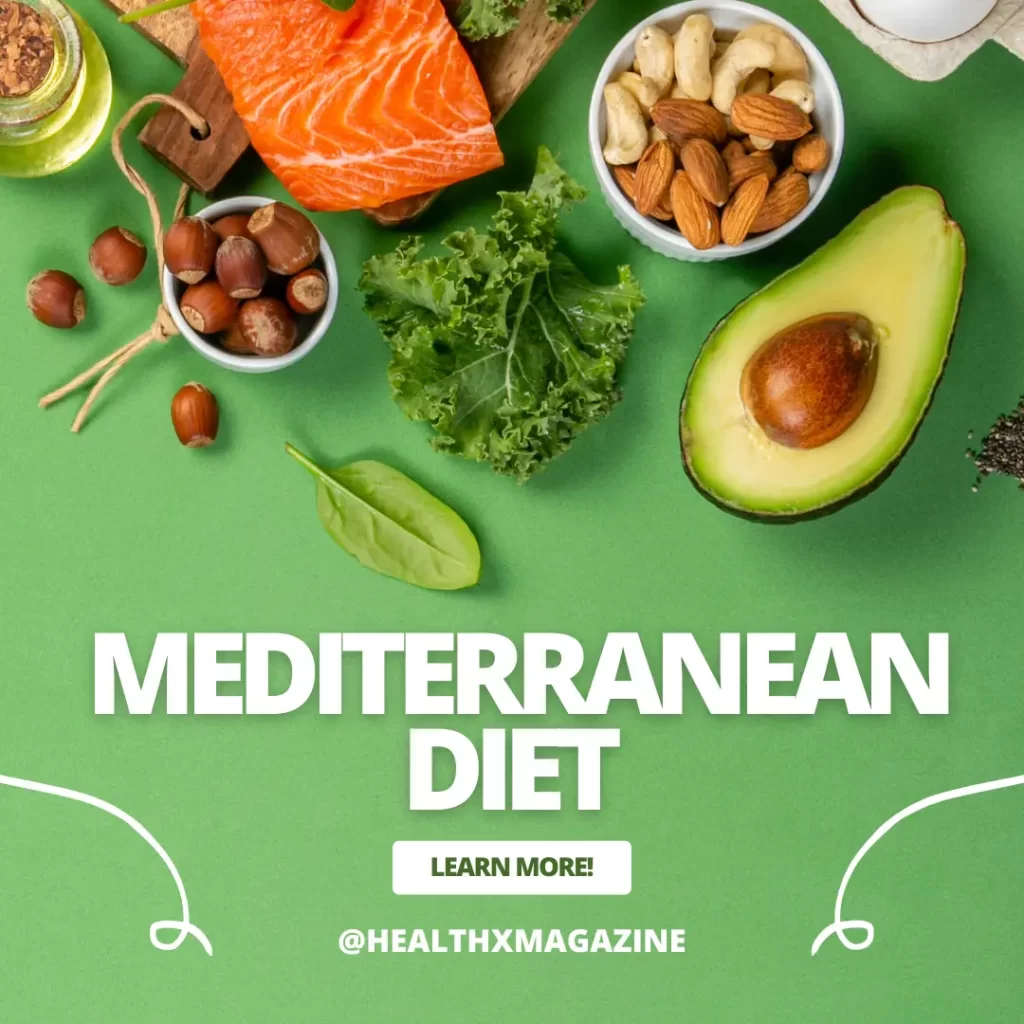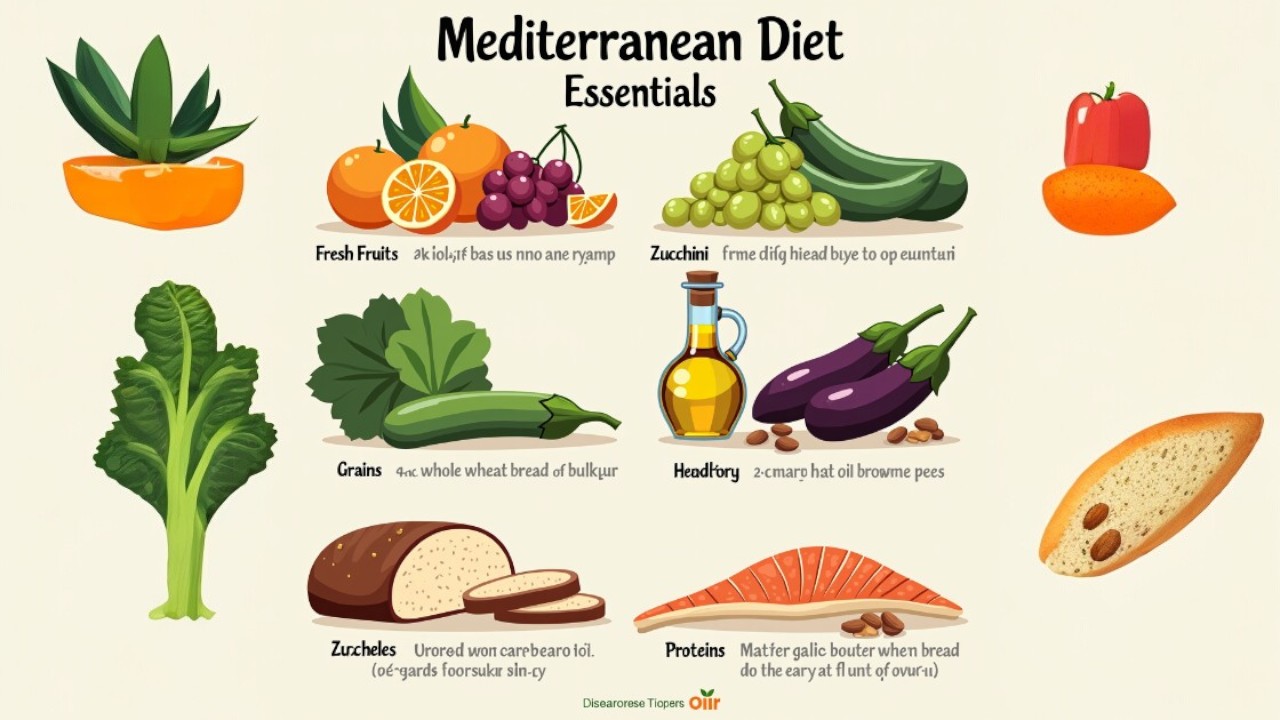The Mediterranean diet has gained immense popularity due to its numerous health benefits and delicious food options. Rooted in the traditional eating patterns of countries bordering the Mediterranean Sea, this diet emphasizes whole foods, healthy fats, and a balanced approach to eating. In this comprehensive guide, we’ll explore the essential foods of the Mediterranean diet and provide practical tips on how to stick to it.
Understanding the Mediterranean Diet
What is the Mediterranean Diet?
The Mediterranean diet is a way of eating inspired by the traditional dietary patterns of countries like Greece, Italy, and Spain. This diet is known for its emphasis on plant-based foods, healthy fats, and moderate consumption of protein. It’s not just a diet but a lifestyle that promotes overall well-being and longevity.
Health Benefits of the Mediterranean Diet
Heart Health
The Mediterranean diet is renowned for its heart-protective benefits. Rich in healthy fats like olive oil and nuts, it helps reduce bad cholesterol levels and lowers the risk of heart disease. The inclusion of fish provides essential omega-3 fatty acids, which are beneficial for heart health.
Weight Management
Adopting the Mediterranean diet can aid in weight management. The focus on whole foods, high fiber content, and balanced meals helps control appetite and promotes a healthy weight.
Diabetes Prevention
The Mediterranean diet helps regulate blood sugar levels and improves insulin sensitivity, making it an excellent choice for preventing type 2 diabetes. The emphasis on whole grains, legumes, and healthy fats contributes to stable blood sugar levels.
Anti-Inflammatory Properties
Many components of the Mediterranean diet, such as olive oil, nuts, and fatty fish, have anti-inflammatory properties. These foods help reduce inflammation in the body. Which is linked to chronic diseases like arthritis and certain cancers.
Essential Foods of the Mediterranean Diet

Fruits and Vegetables
Fruits and vegetables form the foundation of the Mediterranean diet. They are rich in vitamins, minerals, and antioxidants. Include a variety of colorful fruits and vegetables like tomatoes, bell peppers, leafy greens, and berries in your daily meals.
Whole Grains
Whole grains are a staple in the Mediterranean diet. Foods like whole wheat bread, brown rice, quinoa, and barley provide essential nutrients and fiber, supporting digestive health and providing sustained energy.
Healthy Fats
Olive oil is the primary source of fat in the Mediterranean diet. It’s used in cooking, dressings, and as a dip for bread. Other healthy fat sources include avocados, nuts, and seeds, which provide essential fatty acids and promote heart health.
Legumes
Legumes such as beans, lentils, and chickpeas are excellent plant-based protein sources. They are versatile and nutritious. And can be included in soups, salads, and main dishes.
Nuts and Seeds
Nuts and seeds are nutrient-dense and provide healthy fats, protein, and fiber. Common options include almonds, walnuts, flaxseeds, and chia seeds. They make great snacks and can be added to various dishes for extra crunch and nutrition.
Fish and Seafood
Fish and seafood are integral to the Mediterranean diet. Fatty fish like salmon, mackerel, and sardines are rich in omega-3 fatty acids, which support heart and brain health. Aim to include fish in your diet at least twice a week.
Dairy
Dairy products, especially yogurt and cheese, are consumed in moderation. Greek yogurt is a popular choice due to its high protein content and probiotics, which support gut health.
Poultry and Eggs
Poultry and eggs are consumed in moderate amounts. They provide high-quality protein and essential nutrients. Opt for lean cuts of poultry and incorporate eggs into your diet a few times a week.
Herbs and Spices
Herbs and spices are used generously in Mediterranean cooking. They add flavor and have numerous health benefits. Common choices include garlic, basil, oregano, rosemary, and thyme.
Red Wine
Red wine is consumed in moderation in the Mediterranean diet. It contains antioxidants, particularly resveratrol, which may contribute to heart health. Limit intake to one glass per day for women and two for men.
How to Stick to the Mediterranean Diet
Meal Planning and Preparation

Plan Your Meals
Planning your meals helps ensure you stay on track with the Mediterranean diet. Create a weekly menu that includes a variety of fruits, vegetables, whole grains, and lean proteins. Planning ahead can save time and reduce the temptation to eat unhealthy foods.
Batch Cooking
Batch cooking is a great way to prepare healthy meals in advance. Cook large portions of grains, legumes, and roasted vegetables to use throughout the week. This practice makes it easier to stick to the diet, even on busy days.
Smart Shopping
Create a Shopping List
Before heading to the grocery store, create a shopping list based on your meal plan. Stick to the list to avoid impulse purchases and ensure you have all the necessary ingredients for your meals.
Shop the Perimeter
Focus on the perimeter of the grocery store, where fresh produce, dairy, and meats are typically located. Avoid the inner aisles where processed foods are often found.
Eating Out
Choose Mediterranean-Friendly Options
When dining out, choose restaurants that offer Mediterranean-friendly options. Look for dishes that include vegetables, whole grains, and lean proteins. Request olive oil instead of butter for your bread and salad dressings.
Control Portions
Restaurant portions can be larger than necessary. Consider sharing a dish or asking for a half portion. You can also save half of your meal to take home for another meal.
Staying Motivated
Set Realistic Goals
Set achievable goals for your Mediterranean diet journey. Whether it’s incorporating more vegetables into your meals or trying a new Mediterranean recipe each week, setting small goals can help you stay motivated and on track.
Find Support
Having a support system can make a significant difference. Share your goals with friends or family members who can encourage you and hold you accountable. Consider joining a Mediterranean diet group or online community for additional support and recipe ideas.
Adapting the Diet to Your Lifestyle
Be Flexible
The Mediterranean diet is versatile and can be adapted to fit your preferences and lifestyle. If you don’t enjoy certain foods, find alternatives that provide similar nutrients. The goal is to make the diet work for you, not to follow it rigidly.
Incorporate Cultural Foods
Incorporate your favorite cultural foods into the Mediterranean diet. For example, if you enjoy Mexican cuisine, you can use whole grains like quinoa in place of rice and incorporate plenty of fresh vegetables and beans.
Conclusion
The Mediterranean diet offers a balanced, enjoyable way to eat that supports overall health and well-being. By focusing on whole foods, healthy fats, and lean proteins, you can reap the numerous benefits of this diet. With careful planning, smart shopping, and a flexible approach, sticking to the Mediterranean diet can be both easy and rewarding. Embrace the Mediterranean lifestyle and unlock a healthier, happier you.
FAQs
Can I follow the Mediterranean diet if I’m vegetarian?
Absolutely! The Mediterranean diet includes plenty of plant-based foods like fruits, vegetables, whole grains, legumes, nuts, and seeds. You can easily adapt the diet to suit a vegetarian lifestyle.
How can I make Mediterranean diet meals kid-friendly?
Make Mediterranean meals kid-friendly by involving your children in meal planning and preparation. Choose simple recipes and incorporate familiar foods. Offer a variety of colorful fruits and vegetables to make meals appealing.
Is the Mediterranean diet suitable for people with food allergies?
The Mediterranean diet can be adapted for people with food allergies. Focus on the wide variety of foods available and avoid allergens. For example, if you have a nut allergy, you can get healthy fats from olive oil and seeds.
How often should I eat fish on the Mediterranean diet?
Aim to include fish in your diet at least twice a week. Choose fatty fish like salmon, mackerel, and sardines, which are rich in omega-3 fatty acids.
What are some easy Mediterranean diet snacks?
Some easy Mediterranean diet snacks include hummus with vegetables, Greek yogurt with berries, a handful of nuts, or whole-grain crackers with avocado.
Meta Description
Discover the essentials of the Mediterranean diet and how to stick to it. Learn about key foods, meal planning tips, and the numerous health benefits of this balanced diet.











